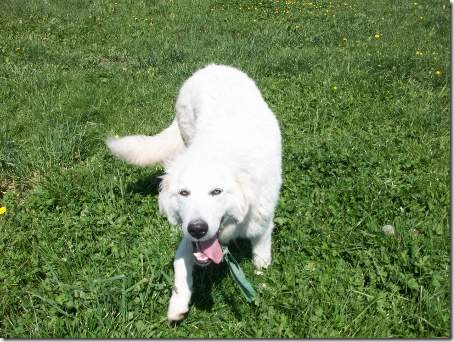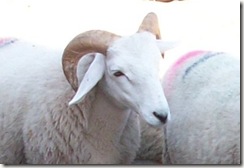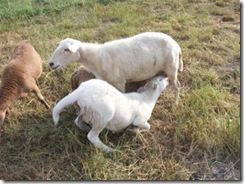 I really appreciate the below quote from the book Livestock Protection Dogs: Selection, Care, and Training by Orysia Dawydiak and David Sims. They capture well some of the thoughts I’ve been having about how to mold our young LGD into a good long-term sheep guardian.
I really appreciate the below quote from the book Livestock Protection Dogs: Selection, Care, and Training by Orysia Dawydiak and David Sims. They capture well some of the thoughts I’ve been having about how to mold our young LGD into a good long-term sheep guardian.
In Old World countries where livestock protection dogs have been traditionally used, lifestyles and farming practices are different than those we know in North America. Throughout Asia, the Middle East and the Mediterranean Basin, full-time shepherds are common. Sheep owners in a village often form communal flocks of sheep during the summer months when high country pastures can be used for grazing. Shepherd and livestock protection dogs accompany large bands of sheep to mountain meadows,. During these times when many protection dos are present, older dogs help to discipline and train younger ones. With one or more shepherds always on duty, undesirable behaviors can be spotted and corrected immediately. In this setting many stimuli act on a protection dog, including social interactions with other dogs. Boredom is unlikely to occur. If attacked or threatened by a predator, a protection do can reasonably expect to be backed up by his fellow pack members. He can also expect that a shepherd will be somewhere nearby, if not always in sight. …
Most North American farms would not fit into the scenario described above. Farms here have fenced pastures in lieu of open maintain rangelands. Livestock are moved abruptly from pasture to pasture, sometimes by truck.There are few full-time shepherds, goat herders, or cattle tenders. Protection dogs are often required to work along without aid or training from an experienced pack of peer dogs. Many protection dogs are initially placed with livestock that have learned to fear dogs. A significant part of the task of protection is having the confidence of the animals being guarded. North American guard dogs may be expected to develop their self-confidence with livestock that will run away from them or even show hostility. After a protection dog has gained the confidence of the flock or herd and has matured into a successful guardian, he is almost always left alone to perform what can be a very boring duty.
When such factors are considered, you may wonder why protection dogs transplanted from the tranquil mountains of Europe and Asia are able to work at all in the United States and Canada. Yet they do! The reason for their success is not so much the training techniques that are described in the succeeding chapters, but rather the highly evolved instincts of the dogs. If you have purchased a healthy protection breed puppy with an established guardian pedigree, he will probably become a good livestock guardian, in spite of any errors, you, the owner/trainer, might commit. In fact, you will never actually “train” your protection dog to protect. You will instead attempt to create an environment in which the dog is able to develop and express his inherited talents.
The challenges I’m observing and facing about our LGD are these: She has no “role model” of an experienced guardian dog to mimic, and there is no older dog, or me, out there 24/7 to scold her if she abuses the sheep. She sees the Border Collies, whom she admires, “chase” the sheep; and is somewhat inclined to mimic this behavior or try to join in. The sheep have learned to move for dogs, so they need to learn a new thing: which dogs to respect, and which dogs to ignore (and even further: eventually they need to learn to go to the LGD if they are fearful of something). Bronte was properly raised in a barn with sheep, so she is dearly bonded to them and has the capacity to walk and sit amongst them calmly. But her desire to treat them like peers gets her into trouble when she sometimes plays to rough with them, in the manner she would wrestle with another adolescent dog.
But, as the above quote points out, the situation is not hopeless. The goal is to create an environment where the dog can make good choices and learn desirable habits, so that over time, her guardian instincts will deploy in the manner I desire. I’ll try to write a bit about my training methods with her in the coming days, and how things have been going so far.
 I’m not sure if I can say which speaker had the most exciting information at The Expo, there were several highlights. But this was one of the top ones for me: Dr. Woody Lane’s two-hour discussion on pasture management and grass. Dr. Lane owns and operates Lane’s Livestock Services, a consulting firm. (I couldn’t find a website to which I could link…). And, everyone seems to just call him Woody. He lives in Roseburg, OR, and frequently teaches a very extensive animal nutrition course in that area.
I’m not sure if I can say which speaker had the most exciting information at The Expo, there were several highlights. But this was one of the top ones for me: Dr. Woody Lane’s two-hour discussion on pasture management and grass. Dr. Lane owns and operates Lane’s Livestock Services, a consulting firm. (I couldn’t find a website to which I could link…). And, everyone seems to just call him Woody. He lives in Roseburg, OR, and frequently teaches a very extensive animal nutrition course in that area.







